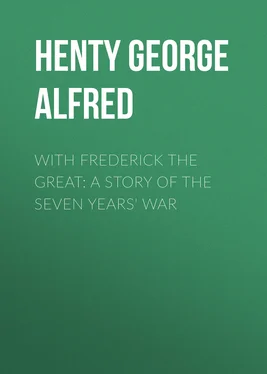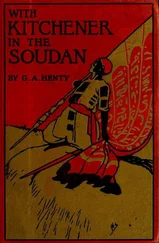George Henty - With Frederick the Great - A Story of the Seven Years' War
Здесь есть возможность читать онлайн «George Henty - With Frederick the Great - A Story of the Seven Years' War» — ознакомительный отрывок электронной книги совершенно бесплатно, а после прочтения отрывка купить полную версию. В некоторых случаях можно слушать аудио, скачать через торрент в формате fb2 и присутствует краткое содержание. Издательство: Иностранный паблик, Жанр: foreign_children, foreign_antique, foreign_prose, prose_military, на английском языке. Описание произведения, (предисловие) а так же отзывы посетителей доступны на портале библиотеки ЛибКат.
- Название:With Frederick the Great: A Story of the Seven Years' War
- Автор:
- Издательство:Иностранный паблик
- Жанр:
- Год:неизвестен
- ISBN:нет данных
- Рейтинг книги:4 / 5. Голосов: 1
-
Избранное:Добавить в избранное
- Отзывы:
-
Ваша оценка:
- 80
- 1
- 2
- 3
- 4
- 5
With Frederick the Great: A Story of the Seven Years' War: краткое содержание, описание и аннотация
Предлагаем к чтению аннотацию, описание, краткое содержание или предисловие (зависит от того, что написал сам автор книги «With Frederick the Great: A Story of the Seven Years' War»). Если вы не нашли необходимую информацию о книге — напишите в комментариях, мы постараемся отыскать её.
With Frederick the Great: A Story of the Seven Years' War — читать онлайн ознакомительный отрывок
Ниже представлен текст книги, разбитый по страницам. Система сохранения места последней прочитанной страницы, позволяет с удобством читать онлайн бесплатно книгу «With Frederick the Great: A Story of the Seven Years' War», без необходимости каждый раз заново искать на чём Вы остановились. Поставьте закладку, и сможете в любой момент перейти на страницу, на которой закончили чтение.
Интервал:
Закладка:
"'You are modest, marshal; but I observe that it is a common fault among your countrymen. Well, which shall it be–infantry or cavalry?'
"'Cavalry, since you are good enough to give me the choice, sire. The uniform looks better, for an aide-de-camp, than that of the infantry.'
"'Very well, then, you may consider him gazetted as a cornet, in my third regiment of Guards. You have no more kinsmen coming at present, Keith?'
"'No, sire; not at present.'
"'If many more come, I shall form them into a separate regiment.'
"'Your majesty might do worse,' I said.
"The king nodded. 'I wish I had half a dozen Scotch regiments; aye, a score or two. They were the cream of the army of Gustavus Adolphus, and if matters turn out as I fear they will, it would be a welcome reinforcement.'
"I will give you a note presently," continued the marshal, "to a man who makes my uniforms, so that I may present you to the king, as soon as you are enrolled. You must remember that your favour, or otherwise, with him will depend very largely upon the fit of your uniform, and the manner in which you carry yourself. There is nothing so unpardonable, in his eyes, as a slovenly and ill-fitting dress. Everything must be correct, to a nicety, under all circumstances. Even during hot campaigns, you must turn out in the morning as if you came from a band box.
"I will get Colonel Grunow, who commands your regiment, to tell off an old trooper, one who is thoroughly up to his work, as your servant. I doubt not that he may be even able to find you a Scotchman, for there are many in the ranks–gentlemen who came over after Culloden, and hundreds of brave fellows who escaped Cumberland's harryings by taking ship and coming over here, where, as they supposed, they would fight under a Protestant king."
"But the king is a Protestant, is he not, sir?"
"He is nominally a Protestant, Fergus. Absolutely, his majesty has so many things to see about that he does not trouble himself greatly about religion. I should say that he was a disciple of Voltaire, until Voltaire came here; when, upon acquaintance, he saw through the vanity of the little Frenchman, and has been much less enthusiastic about him since.
"By the way, how did you come here?"
"We heard of a ship sailing for Stettin, and that hurried my departure by some days. I made a good voyage there, and on landing bought a horse and rode here."
"Well, I am afraid your horse won't do to carry one of my aides-de-camp, so you had best dispose of it, for what it will fetch. I will mount you myself. His majesty was pleased to give me two horses, the other day, and my stable is therefore over full.
"Now, Fergus, we will drink a goblet of wine to your new appointment, and success to your career."
"From what you said in your letter to my mother, sir, you think it likely that we shall see service, before long?"
"Aye, lad, and desperate service, too. We have–but mind, this must go no further–sure news that Russia, Austria, France, and Saxony have formed a secret league against Prussia, and that they intend to crush us first, and then partition the kingdom among themselves. The Empress of Austria has shamelessly denied that any such treaty exists, but tomorrow morning a messenger will start, with a demand from the king that the treaty shall be publicly acknowledged and then broken off, or that he will at once proclaim war. If we say nine days for the journey there, nine days to return, and three days waiting for the answer, you see that in three weeks from the present we may be on the move, for our only chance depends upon striking a heavy blow before they are ready. We have not wasted our time. The king has already made an alliance with England."
"But England has no troops, or scarcely any," Fergus said.
"No, lad, but she has what is of quite as much importance in war–namely, money, and she can grant us a large subsidy. The king's interest in the matter is almost as great as ours. He is a Hanoverian more than an Englishman, and you may be sure that, if Prussia were to be crushed, the allies would make but a single bite of Hanover. You see, this will be a war of life and death to us, and the fighting will be hard and long."
"But what grievance has France against the king?"
"His majesty is open spoken, and no respecter of persons; and a woman may forgive an injury, but never a scornful gibe. It is this that has brought both France and Russia on him. Madame Pompadour, who is all powerful, hates Frederick for having made disrespectful remarks concerning her. The Empress of Russia detests him, for the same reason. She of Austria has a better cause, for she has never forgiven the loss of Silesia; and it is the enmity of these women, as much as the desire to partition Prussia, that is about to plunge Europe into a war to the full as terrible as that of the thirty years."
Keith now rung a bell, and a soldier entered.
"Tell Lieutenant Lindsay that I wish to speak to him."
A minute later an officer entered the room, and saluted stiffly.
"Lindsay, this is a young cousin of mine, Fergus Drummond. The king has appointed him to a cornetcy in the 3rd Royal Dragoon Guards, but he is going to be one of my aides-de-camp. Now that things are beginning to move, you and Gordon will need help.
"Take him first to Tautz. I have written a note to the man, telling him that he must hurry everything on. There is still a spare room on your corridor, is there not? Get your man to see his things bestowed there. I shall get his appointment this evening, I expect, but it will be a day or two before he will be able to get a soldier from his regiment. He has a horse to sell, and various other matters to see to. At any rate, look after him, till tomorrow. 'Tis my hour to go to the king."
Lindsay was a young man of two or three and twenty. He had a merry, joyous face, a fine figure, and a good carriage; but until he and Fergus were beyond the limits of the palace, he walked by the lad's side with scarce a word. When once past the entrance, however, he gave a sigh of relief.
"Now, Drummond," he said, "we will shake hands, and begin to make each other's acquaintance. First, I am Nigel Lindsay, very much at your service. On duty I am another person altogether, scarcely recognizable even by myself–a sort of wooden machine, ready, when a button is touched, to bring my heels smartly together, and my hand to the salute. There is something in the air that stiffens one's backbone, and freezes one from the tip of one's toes to the end of one's pigtail. When one is with the marshal alone, one thaws; for there is no better fellow living, and he chats to us as if we were on a mountain side in Scotland, instead of in Frederick's palace. But one is always being interrupted; either a general, or a colonel, or possibly the king himself, comes in.
"For the time, one becomes a military statue; and even when they go, it is difficult to take up the talk as it was left. Oh, it is wearisome work, and heartily glad I shall be, when the trumpets blow and we march out of Berlin. However, we are beginning to be pretty busy. I have been on horseback, twelve hours a day on an average, for the past week. Gordon started yesterday for Magdeburg, and Macgregor has been two days absent, but I don't know where. Everyone is busy, from the king himself–who is always busy about something–to the youngest drummer. Nobody outside a small circle knows what it is all about. Apparently we are in a state of profound peace, without a cloud in the sky, and yet the military preparations are going on actively, everywhere.
"Convoys of provisions are being sent to the frontier fortresses. Troops are in movement from the Northern Provinces. Drilling is going on–I was going to say night and day, for it is pretty nearly that–and no one can make out what it is all about.
Читать дальшеИнтервал:
Закладка:
Похожие книги на «With Frederick the Great: A Story of the Seven Years' War»
Представляем Вашему вниманию похожие книги на «With Frederick the Great: A Story of the Seven Years' War» списком для выбора. Мы отобрали схожую по названию и смыслу литературу в надежде предоставить читателям больше вариантов отыскать новые, интересные, ещё непрочитанные произведения.
Обсуждение, отзывы о книге «With Frederick the Great: A Story of the Seven Years' War» и просто собственные мнения читателей. Оставьте ваши комментарии, напишите, что Вы думаете о произведении, его смысле или главных героях. Укажите что конкретно понравилось, а что нет, и почему Вы так считаете.












